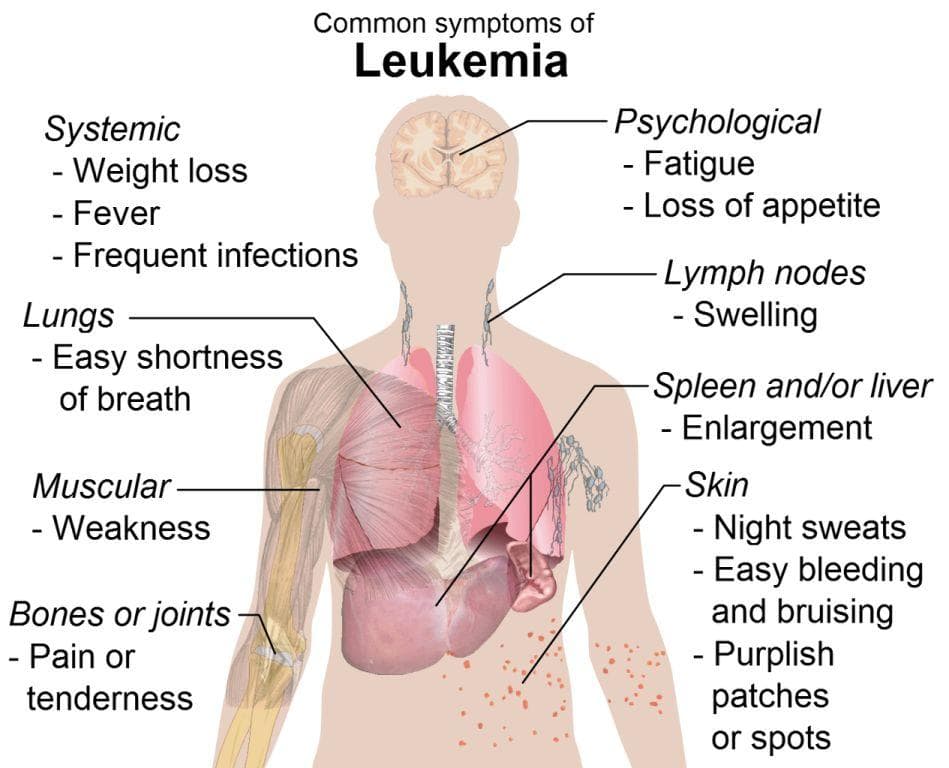Is your Body Telling You About these Leukaemia Symptoms?
There may be many more probable leukaemia symptoms apart from the ones that you know. Being aware of these changes in your body can be helpful in faster treatment of the disease.
What is leukemia?
Leukaemia is a cancer of the blood cells that starts in the bone marrow, the soft tissues inside most of our bones. When a person develops leukaemia, this bone marrow starts producing plenty of abnormal white blood cells, which skew the functioning of the healthy cells.

What are the types of leukaemia?
In general, leukaemia is grouped as acute or chronic depending on how fast the leukaemia symptoms get worse. People with the acute form of the disease experience leukaemia symptoms that worsen rapidly and make them feel sick immediately. On the other hand, those with chronic leukaemia may not even experience any symptoms for years, as the disease progresses in a slow manner for such people. Also, leukaemia is categorized as different kinds based on the type of blood cells in your body that is affected by the disease. There are four main types of leukaemia—
- Acute lymphoblastic leukaemia (ALL)
- Acute myelogenous leukaemia (AML)
- Chronic lymphocytic leukaemia (CLL)
- Chronic myelogenous leukaemia (CML)
In addition, hairy cell leukaemia and acute promyelocytic leukaemia are some of the subtypes and lesser known types of the disease.
What are the different leukaemia symptoms?
In many cases, people do not experience any leukaemia symptoms in the early stages. Also, the leukaemia symptoms in your body may progress either at a rapid pace or surface slowly depending on the type of leukaemia that you have. Being aware of the common as well as lesser-known leukaemia symptoms can help you notice any changes in your health and seek treatment at the earliest. Here are the leukaemia symptoms that you should know about.
Common Leukaemia Symptoms
- Feeling exhausted and weak frequently without any apparent reason
- Frequent fevers and chills
- Pain in the bones or joints
- Frequent infections
- Petechiae (small red spots under the skin)
- Recurrent bleeding from the gums, nose, or rectum
- Heavy menstrual bleeding
- Headaches
- Night sweats
- Shortness of breath
- Unexplained loss of appetite or sudden weight loss
- Discomfort in the abdomen
- Swelling and pain on the left side of your stomach
- Frequent abnormal bruising
Other Possible Leukaemia Symptoms and Signs
In addition to the usual leukaemia symptoms, there might be other signs, which include–
- Swollen lymph nodes: Some people who have leukaemia may experience a visible swelling in the neck, armpit, or groin. This typically occurs when the cancer has spread to your lymph nodes.
- Anemia : Anemia is an indication of a low count of your body’s red blood cells. These blood cells are responsible for carrying oxygen to different parts of your body, and so anemia can lead to fatigue, a feeling of weakness, or shortness of breath.
- Leukopenia : This means a decrease in the number of your white blood cells. This can weaken the immune defense of your body, placing you at a higher risk of infections.
- Thrombocytopenia : This means a low blood platelet (blood cells that are responsible for clotting the blood) count. A deficit of these platelets can cause easy bleeding or bruising.
- Enlarged liver or spleen : The growth of abnormal blood cells in your liver or spleen can result in a loss of appetite (notice if you are constantly feeling full) or swelling in the upper left part of your abdomen.
Some of the leukaemia symptoms, like fever, night sweats, fatigue, and body pain can be confusing as these resemble symptoms of a cold or flu. Remember that flu symptoms usually subside in a few days. So if these symptoms are persistent, visit the doctor to determine the actual reason of your health problems. If they are leukaemia symptoms, an early diagnosis and treatment can make a vast difference to your prognosis.